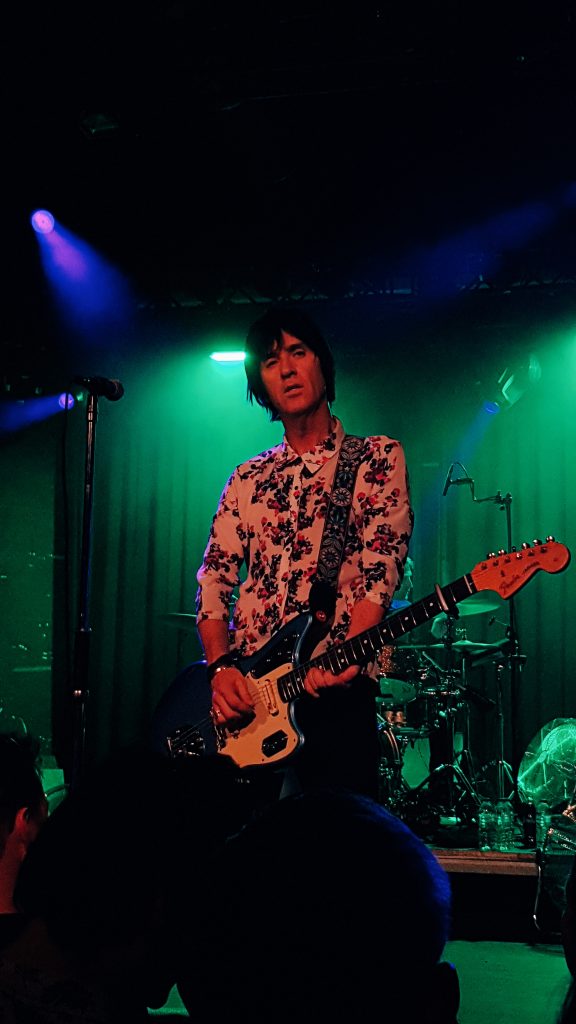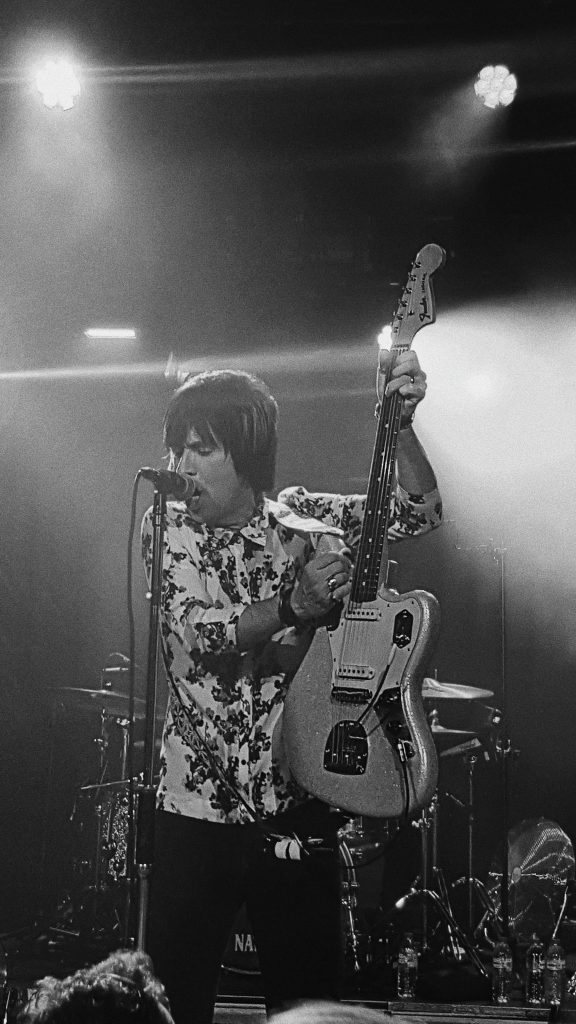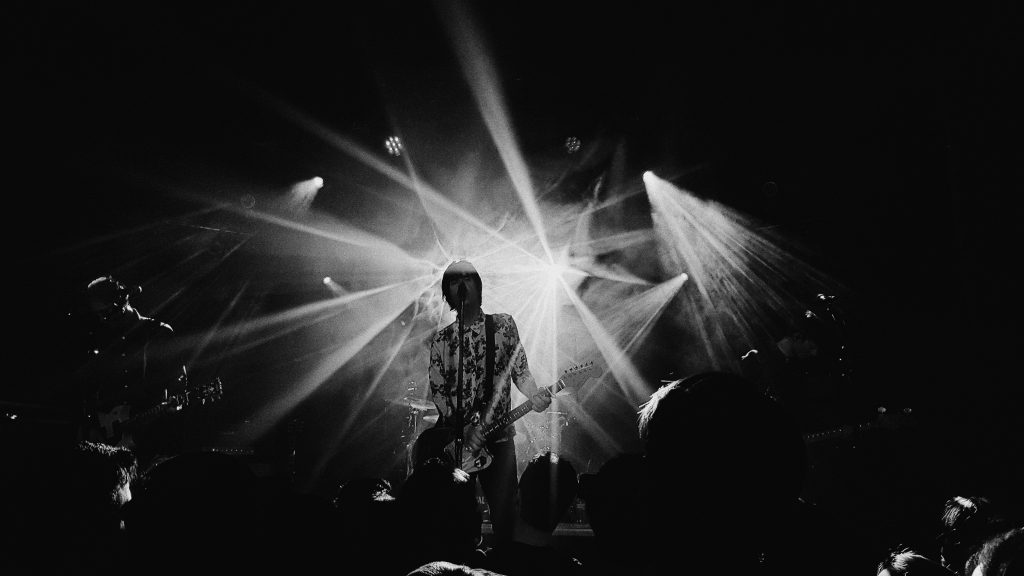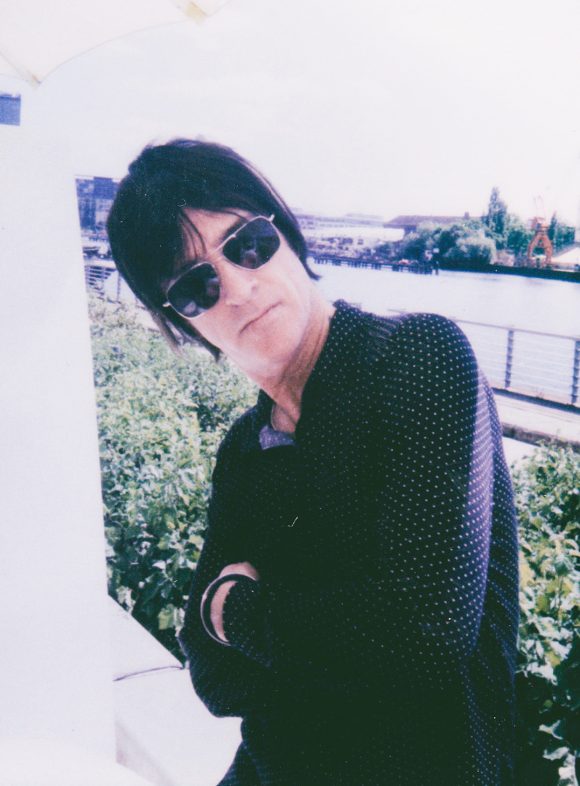Johnny Marr‘s new solo record ‘Call The Comet’ is finally out! The first two singles ‘The Tracers‘ and ‘Hi Hello‘ have already found their way into our playlists – and our new favourite track ‘Day In Day Out’ has just joined them.
I had the absolute pleasure to meet the legendary guitarist of The Smiths, past member of Modest Mouse, The The, Electronic and other incredible bands, for an exclusive interview in Berlin on the day after his brilliant show at Festsaal Kreuzberg. We talked about the upcoming record, being a producer of your own music, collecting vinyl, quitting alcohol and how boredom can be the best thing in the world.
Your new album will be out very soon! I’ve already read a lot about it, so I won’t make you tell me all the stuff you already told other interviewers all over again… but I still have three rather specific questions about the record.
Why did you choose the title ‘Call The Comet’?
When I am writing I get into a sort of headspace that takes over my life – I feel like that is the only way for me to do it. I’ve always got my antenna on for titles and for good little lines, I’ve been like that since I was a child, even in the Smiths days I was always writing things down. But when I’m actually making a record properly it completely overtakes me, so I can wake up in the middle of the night and I have an idea for a song or something. So, I woke up at about 4AM or something with this idea that seemed to be coming from my entire body that just said ‘Call The Comet’ – and I think what it felt like was a calling to something outside of this world. Because it wasn’t something I’d read in a book, it wasn’t something I intellectualized, it’s like it came from a feeling, you know? And I thought ‘Ah, that’s quite an interesting phrase, I need to write a song around that’. So then I tried to create this science fiction story about humanity, with having this feeling where we need some help. It’s not a negative or destructive phrase, it’s asking for some sort of guidance really. And the more I thought about it… human nature… we’ve had so many wars and so much bloodshed in the name of religion or this god/idea that no one has got any real knowledge about. But we do know about comets, so why can’t I just come up with this story about a comet coming to the earth? I didn’t even know I was into science fiction, but then that got me onto a whole lot of reading, and it got me back into H. G. Wells, and I found that he wrote this book called ‘In the Days of the Comet’ – which is a bit of a heavy book. But the more I thought about it, the more I turned it into a positive kind of request. And because right at this moment, I definitely don’t believe in politics and I don’t believe in capitalism, but I think it’s quite healthy to say ‘Give us help’, you know? We’re not going to think our way out of this. So yeah, it came from this subconscious kind of feeling and once I’d written ‘The Tracers’, every time I sung it in the studio, I went like ‘Ah, that sounds like an album title’. That is the story of it.
I saw and hear a lot of 12 string action going on on ‘Hi Hello’ – did you use the 12 string a lot on this record?
Yeah! I used the 12 string a lot on ‘Hi Hello’, also on ‘A Different Gun’ and the main riff of ‘The Tracers’ is 12 string, too. I don’t take the 12 string out live because I don’t really need it, my Jag gets a pretty good sound and I can swing it around and all of that, you know. Another one I used it on is ‘Day In Day Out’ – I played that one last night. Yeah, the 12 string has made a return and you know what I’d like to do? To be honest I’d like to write a few more 12 string songs.
You’re a producer yourself, were you involved in the production this time? Having produced so many records in your life I could imagine it being hard to completely give away the ‘control’ of the production part…
I did produce the album yeah, together with Doviak, who also plays in my band. I’d actually like to find a producer to take some of the work off me really! But I kind of like… know what I’m doing. It’d be nice to have somebody that could get into the studio before me in the morning and leave as the last one at night, but I’m always the first guy in there and the last one to leave. I kinda have to phone the other guys and ask ‘Can you come and fix the bass?’ – I’d like for someone to be there and do that. I was nearly gonna work with Nick Launay. I worked with him when I was in The Cribs – he also does a lot of stuff with Nick Cave. I’d quite like to work with Nick Launay in the future if we can get it together. We nearly did it on this record, but he was doing Black Rebel Motorcycle Club and something else, so I just ended up doing it myself. And I produced so many records by now, I get asked to produce other people’s work. But it’s kind of hard when you’re writing the words as well. You’re just wearing all these different hats. ‘Now I have to write the words, now I have to put the microphones on blah blah blah’… but I’d like to get a producer, one day!

Johnny Marr live at Festsaal Kreuzberg, photo by Lisa Lovegood, © indie.vidualist
You also started super young, right? How did you get into producing records in the first place?
Before The Smiths I started making these tapes that were just loads of guitars on top of guitars on top of guitars… and that got me interested in technology and how guitars fit together. But really what happened was, when The Smiths first went into the studio to record ‘Hand In Glove’ – which is our first song – everyone just looked to me. And I was terrified. I didn’t know what I was doing. But I pretended I do? Which is why that record sounds pretty weird. (laughs)
Well, I like it, so don’t worry, ha!
Ha, I heard it recently and just thought… it’s a strange sounding record. The guitars are really quiet, the bass is really loud, one guitar is on one side… I listened to it and I thought that’s very eccentric. But you know, I was just a kid then, I was 18, and just pretended I knew what I was doing. But then, when we made our first album, we had one go with this guy called Troy Tate who was in a band called The Teardrop Explodes – and he was a really good producer. I really liked him and watched everything he was doing very carefully. I would get in the studio in the morning and I’d be like ‘Ahh, he put the echo on there… and oh, that’s interesting, he put a piano with the guitar’. And then we had a second session with another producer, with whom we made the album as it came out, John Porter. And he taught me loads! I would be in the studio first thing in the morning and stay till the last second at night, like a student. And then The Smiths did this cool thing – when we came to make ‘Meat Is Murder’ they all just said: ‘We don’t need him, you can do it!’. And then I started making the records. It’s a bit like directing a movie. You can be like ‘I want this bit to be more dramatic, I want that bit a little more quiet’… and I studied records since I was a child – I still do! And I was always reading stuff like that. *points towards my book about Lou Reed’s Transformer by Ezra Furman*
In an interview you said ‘Hi Hello’ might be your favourite song that you ever made, why exactly this one?
Because it’s so emotional. When I said that in the press, what I also meant was that this is my favourite album that I ever made. And I don’t always say that. It’s not out yet, but I’ve got a feeling that people who like me are going to like this record. I feel like I’m able to still be doing something different, like with the songs ‘New Dominions’, ‘Actor Attractor’ and ‘Walk Into The Sea’. And then there are tunes like ‘Day In Day Out’ and ‘Hi Hello’ that sound like me, really. You know, a lot of people say ‘Hi Hello’ sounds like The Smiths – well yeah, that’s fine, cause it sounds like me. I always try to find a way to not sing about my feelings, because maybe I think it’s a bit… uncool? But on ‘Hi Hello’… the tune was so pretty, and I felt like I need to sing about something that means something to me. So I sang about my daughter. If you’re very lucky as a parent, you’ve got a good relationship with your daughter, and you can learn something from it. Years ago I would have been like ‘Nah, that’s way too personal, too corny’ but you know what, life’s too short. I didn’t want to look back and go ‘Ah, you were a chicken’. I hope other guys can relate to this song, and also girls.
That’s great to hear, and pretty cool!
Thanks!

Johnny Marr live at Festsaal Kreuzberg, photo by Lisa Lovegood, © indie.vidualist
Your life has always been all about music and you always loved discovering new artists and bands. Are you grateful having grown up in a time without Spotify and all the stuff that makes music so easily accessible, and maybe less appreciated?
Yeah. The thing that I really like about Spotify is that… if I like a song and can just Shazam it, and then listen to it 11 times on the train – I’m happy. Of course it’s not good for the artists as they don’t get paid, but as a sort of responsible older person now, I think you have to accept the world for what it is, and make the best of it. It’s a little like the difference between looking at a picture on your phone and looking at a polaroid. I grew up with 45s and vinyls, but just because Spotify and digital streaming exists, I can still play vinyl. Those days aren’t over, we’ve just got more choice now.
You’re a good example, you still have a polaroid camera, just like I still have my record deck.
Something that happened definitely because of the time I grew up in is that when I’m making an album, I think of an album. I think ‘Ok, most people are not going to listen to the whole album’ – even my friends probably aren’t gonna listen to the full album, those bastards. (laughs) Imagine you were doing an exhibition with your polaroids, you think of the room with all the photographs in it, and then someone walks in and just looks at one, and then leaves. An album gives you a conceptual frame work – it’s not about retro or nostalgia for me, it just works as a concept. And in that way I can go like ‘Ok I will put an electronic song there, now I need to put a guitar song there and now a dramatic song…’ – and it gives me that sort of foundation. And I also love what they are as objects. I love vinyl.
I agree. I have a large record collection at home and enjoy putting on a vinyl now and then. I just like to actually have a physical product when I spend my money on music.
Yes, that’s great! My rule with my records now is: any records I’m not gonna play – I lose. Or any books that I’m not going to read – I get rid of. For years and years I would buy records because I thought ‘Oh that’s a cool record to have’ or ‘That’s a nice sleeve’ – now I’m like… I just wanna listen to it. But yeah I’m with you, you want something to hold, an artefact.
I read your book and you decided to quit alcohol many years ago. What has changed (and probably improved) after that decision? I recently decided to do the same, hence I’m very excited to finally speak to someone that shares my opinion on alcohol. Sadly that doesn’t happen very often.
Oh did you? Amazing. After I quit what happened was: it gave me my attitude back. It made me more radical. Especially when you get older. As an older guy I didn’t want to be a cliché, I didn’t want to be that guy, the old rocker, you know. But the positives it gave me was that I’m more creative now. My lyrics are better, my ideas are more radical. If you imagine a really good writer, like Virginia Woolf, William S. Burroughs or whoever you like as a writer, if they were just gonna write something and then went like ‘Ah fuck it, I’m gonna go to the pub’ – that piece of work was never done. And I know a lot of people who are like that, a lot of musicians who are like that. Instead of going to the bar, or opening a bottle of wine while watching youtube, you take that out of it, the thing that makes you a creative person: boredom. I find that a lot of good stuff comes out of being bored. I remember when I was a kid, I always wanted to play the guitar and learn how to write songs and stuff, but man, I used to be so bored. And then I would write these little stories or draw in these books, and then I started making these tapes on my guitar. If I had gone out and got fucked up I wouldn’t have done that. A lot of people who drink go ‘Oh what am I going to do on the weekend if I don’t go out, I’m gonna be so bored’ – but there is nothing wrong with being bored! It’s a good place to be! Especially when you’re a creative person! You really need to do something there. Sometimes being creative is a bit tough, you’re not inspired or you’re looking for an idea… but nothing’s gonna come if you just sit in a bar.
The other guys in my band drink, and I have lots of friends that drink – I’ll pour people glasses of champagne, and if it’s funny I like it… but alcohol is just not for me.
And last but not least – a super random one, since I’m working on moving there – what is the best thing about your hometown Manchester?
Oh, wow. The best thing about it is that it’s a place where you are kind of expected to be doing something. Particularly when you’re a young person. Because it’s not quite as easy to hang out as it is here in Berlin or Cologne or something… you kind of have to form a band, or be a promoter, manager, or do websites – there are not a lot of people who do nothing in Manchester. It’s been that way for a long long time, it’s been that way since I was a kid. Everyone who doesn’t do a straight job has some creative hustle going on – which I think is really good for you. And also, it has a certain attitude. Manchester is a bit like the British Amsterdam. The people, they’re kinda friendly, but they are sort of mellow. They leave you to your own thing, I find the Dutch to be very much the same. In Liverpool people are really friendly, in Glasgow people are very edgy, but in Manchester, they just let you be who you are. And another thing – the gay scene in Manchester is better than anywhere else in the country, even better than in London, and that has a great influence on the culture. If you’re into electronic music, which I know you are more into guitar music, but Manchester has a decent electronic scene. And hey, how many amazing poets have come out of Manchester? Wether it’s Mark E. Smith, Ian Curtis, Shaun Ryder or Morrissey – it’s good. You’re in the right place.
Massive thanks to Johnny for this wonderful interview!
Make sure to pre-order his album and catch him on tour soon! You can find all dates here.

Johnny Marr live at Festsaal Kreuzberg, photo by Lisa Lovegood, © indie.vidualist
